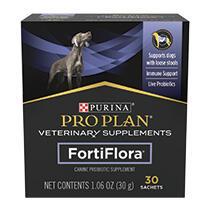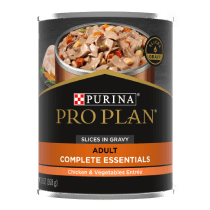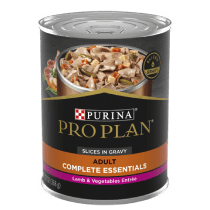
PRO PLAN Veterinary Diets Canine UR Urinary Dry Formula
- Specially formulated to promote an acidic urine to help reduce urinary struvite stone formation and promote dissolution.
- Moderate protein to help minimise substrate availability for urease-producing bacteria.
- Highly palatable for long term feeding.
PRO PLAN Veterinary Diets Canine UR Urinary Dry Formula
A complete diet to help reduce urinary struvite stone formation and promote dissolution of struvite stones in adult dogs. It is formulated to control the pH of the urine and contains a restricted level of high-quality protein. This diet is also highly palatable for long term feeding.
- Specially formulated to promote an acidic urine to help reduce urinary struvite stone formation and promote dissolution.
- Moderate protein to help minimise substrate availability for urease-producing bacteria.
- Highly palatable for long term feeding.
Ingredients
Maize*, wheat flour*, dehydrated poultry protein*, rice*, animal fat, maize gluten meal*, digest*, dried beet pulp*, dried egg*, minerals, fish oil. *Protein sources. Urine acidifying substances: calcium sulphate, phosphoric acid.
Guaranteed Analysis
| Moisture | 7% |
| Protein | 22% |
| Fat | 15% |
| Carbohydrate | 49.6% |
| Crude fibre | 1.5% |
| Calcium | 0.63% |
| Phosphorus | 5.62% |
| Sodium | 0.2% |
| Potassium | 0.7% |
| Magnesium | 0.08% |
| Chloride | 0.7% |
| Sulphur | 0.3% |
| Vitamin E | 304 IU/kg |
| Metabolisable energy (ME)1 | 3.98 kcal/g |
*Typical analysis in the final product as fed. 1 Calculated following NRC 2006 equations.
It is recommended that a vet’s opinion is sought before use or before extending the period of use.
| Adult Maintenance | |
| Body weight (kg) | Daily feeding quantity (g/day) |
| 2.5 | 65 |
| 5 | 105 |
| 10 | 165 |
| 15 | 215 |
| 25 | 300 |
| 35 | 380 |
| 45 | 450 |
| 70 | 600 |
Increased water consumption can help dilute the urine and further decrease the risk of crystal formation. For dissolution of struvite stones, an initial feeding period of 5-12 weeks is recommended. For long-term use, an initial feeding period of up to 6 months is recommended, but the dog should be re-evaluated regularly as indicated by the underlying condition.





